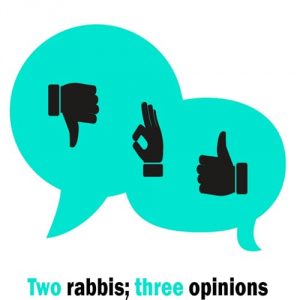Two Rabbis, Three Opinions Episode 21

Is it good, bad, or both to live in a bubble? What to do when you never had to live in an echo chamber before – and now find yourself planted in the middle of one? Listen as we ponder these issues and more
Spotify: https://open.spotify.com/episode/1g1Ve2isw1M8OWuvCpdwsA


1) Avoiding sin is entirely different from avoiding knowledge. 2) What works in the short-term does not necessarily work in the long-term. 3) To declare that the Torah cannot operate in the world, is to underappreciate the strength of our traditions. 4) As the Gaon said, missing aspects of general knowledge, negatively impacts Torah knowledge. As an example, there have been only 3 significant works on masechet Kinnim. all by Ph.D.’s in mathematics related disciplines. OTOH, some pronouncements on science related topics by (so-called) gedolai Torah are a disgrace, bordering on a hillul HaShem.
I must add the words “in the past 30 years” after 3 significant works.
“There is so much challenge that is built into life even if you’re living in Monroe and you don’t travel to Manhattan by bus”( Minute 15 of podcast)
This reminded me of part of a response from R. Yaakov Kaminetzky to a small group of educators, including Rabbi Dr. Aharon Hersh Fried, about the issue of exposure to the secular. It was quoted in R. Fried’s Hakirah article, “Are Our Children Too Worldly?”(Winter 2007), excerpted and linked below:
“… I’m often asked here in Monsey and especially regarding girls, “How much should we or can we shut them off to protect them from the culture at large?” I always tell them, “You can’t! Unless, that is, you live in Squaretown.” Now especially; I understand they have their own hospital and their own cemetery, one can be born there, live ones life there, and be buried there. To those who can do that, ‘Tavo aleihem brachah’ (may they be blessed). Most of us, however, do not live in Squaretown and cannot live in Squaretown. So what will you do? Not tell a young boy about evolution and then wait until at age 16 or 17 he reads in the New York Times…He’ll be completely lost!…”(p. 41)
The background for R. Fried’s 2007 article was a 1991 West Coast Conference of Agudah, addressing the question, “Are our children too worldly?” R. Fried differed from others on the panel, saying that in some significant ways “our children were not worldly enough.” He writes in the beginning of the Hakirah article that “I felt this to be the case then, and I feel it is so today, though to a greater degree. And I feel that the trend has not reached its end. I sense that we are on a path that is at an increasingly faster pace narrowing the world of our youth.”
https://hakirah.org/Vol%204%20Fried.pdf